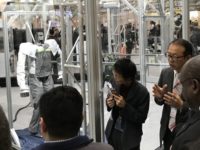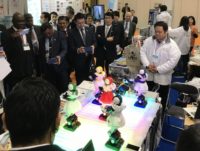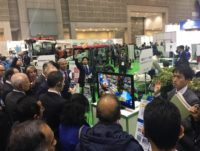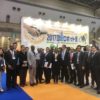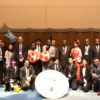The day was chilly as it was described as “the beginning of winter” in Tokyo, while the International Robot Exhibition (iREX) 2017 venue was heating up with small agile robots up to large robots that can stretch their arms out to the ceiling and to the crowds of people surrounding them.
iREX, which is held bi-annually, realized a record of 612 exhibitors and 130,480 visitors this year, which is far beyond the results of 2015.
45 participants from the 28 countries including 5 Ambassadors invited to the event by UNIDO ITPO Tokyo as part of the Embassy Programme were split into two groups upon arrival to Tokyo Big Sight. Using ear pieces for interpretation as their ultimate guide, the two groups were quick to dive into the venue filled with robots and visitors. Their destinations were to four booths: Kawasaki Heavy Industries, Kanagawa Robot Innovation, Ministry of Agriculture, Forestry and Fisheries, and Tokyo Metropolitan Industrial Technology Research Institute.
As Kawasaki Heavy Industries celebrates its 50th anniversary of its Robot Business Center, which was one of the very first to enter the robot market, Mr. Toshiya Okuma of the company explained that “with demand for medical and service robots, we need to go beyond industrial robots and be committed to face challenges with an effort to build a better future”. The group was very much leaning in to hear the reality of robots taking over the work of humans through various applications as Japan’s society ages and population decreases.
At the booth of the Kanagawa Robot Innovation (A collaborative exhibition by the Kanagawa Prefecture, Kanagawa Institute of Industrial Science and Technology and various organizations or KISTEC), Mr. Yoshiaki Itoh of KISTEC began by explaining that the booth is catered to support the exhibition of SMEs within the prefecture. The booths of VECTOR (a service robot provider), KOWA TECH (specializing in the development of robots that could be activated in areas with much risk, especially after natural disasters), iXs Research (specializing in robots where humans cannot be present), along with Daiwa House Industry, Ogawayuki and DOUBLE Research and Development were introduced one after another. Yokohama Factory, which focus is to gather SMEs to resolve challenges that cannot be clarified by one company was also introduced as one of the unique models of the prefecture.
The group was then led to the booth of the Ministry of Agriculture, Forestry and Fisheries, which was also comprised of various organizations and companies. Mr. Toru Kakubari of the Ministry explained that the government’s efforts have been focusing on collective farm policy as the ageing society creates less farmers engaged in this field. “The era of robots taking on farming in Japan is therefore just around the corner, which also coincides with further development of cost-efficient farming machinery”, added Mr. Kakubari. The robot that the group was most attracted to was the tomato farming robot which works throughout the night. While ideas arise from the challenges entailed in the ageing society, the diplomats on the tour expressed interest in applying such ideas to their own countries for efficiencies, although they may not be necessarily faced with the same challenges as those in Japan.
The last destination of the tour was to the booth of the Tokyo Metropolitan Industrial Technology Research Institute, where Mr. Yuji Takeda explained that their role was to develop technologies and pass them on to companies to take the ideas forward to the commercial level. Some of the robots introduced included those that are already active in museums, and also interpretation robots that aim to be further fine-tuned for the upcoming Tokyo2020 Olympics and Paralympics. Robots assisting people with challenges of Aphasia were also introduced as part of the effort by the metropolitan government to develop service robots that contribute to people and society through their daily lives.
The group expressed much interest not only in the technology but also in the approach to the development of robots, in which robots are produced based on the needs of society.
Following the tour, the group participated in an international reception held for the first time by the organizer, Nikkan Kogyo Shimbun, where participants enthusiastically shared their thoughts on the tour throughout the afternoon. Their minds were on both fascinating technologies and also on the robots that could be of use to answer needs in their respective countries.
Ms. Saori Abe from the Nikkan Gogyo Shimbun, secretariat of the exhibition and the tour by UNIDO for the second time since 2015 commented, that the organizer “treasures the occasion of having the group of diplomats at the exhibition”.
Thanks to the innovative robots for bridging and connecting groups of people.
Outline
| Event: | International Robot Exhibition (iREX) 2017 |
| Theme: | The Robot Revolution Has Begun – Toward Heartwarming Society |
| Organizers: | Japan Robot Association (JARA), The Nikkan Kogyo Shimbun Ltd. |
| Dates: | November 29 (Wed.) – December 2 (Sat.) |
| Venue: | Tokyo Big Sight East Hall 1-6 |
Booths visited
- Kawasaki Heavy Industries
- Kanagawa Robot Innovation
(A collaborative exhibition by the Kanagawa Prefecture, Kanagawa Institute of Industrial Science and Technology and various organizations or KISTEC) - Ministry of Agriculture, Forestry and Fisheries
- Tokyo Metropolitan Industrial Technology Research Institute
Participated Embassies / Organization
Bolivarian Republic of Venezuela, Kingdom of Cambodia, Democratic Republic of Timor-Leste, Federal Republic of Nigeria, India – Automotive Component Manufacturers Association of India (ACMA), Kingdom of Bahrain, Kingdom of Lesotho, Kingdom of Morocco, Malaysia – Malaysia External Trade Development Corporation (MATRADE), Plurinational State of Bolivia, Republic of Armenia, People’s Republic of Bangladesh, Republic of Belarus, People’s Republic of China, Republic of Colombia, Republic of Congo, Republic of Djibouti, Republic of Ecuador, Republic of Haiti, Republic of Iraq, Republic of Mozambique, Republic of Panama, Republic of South Africa, Republic of Tajikistan, Republic of Togo, Republic of Turkey, Republic of Uzbekistan, Russian Federation




